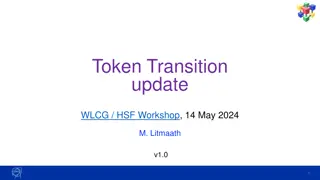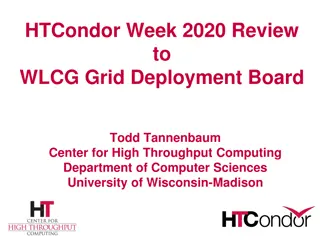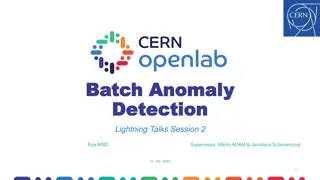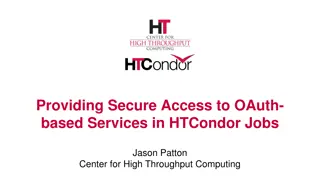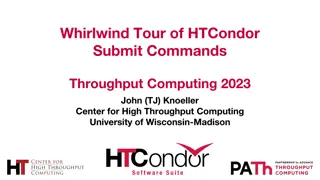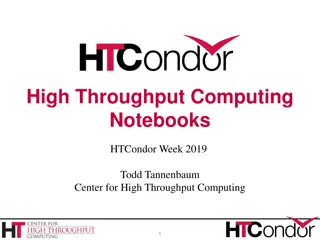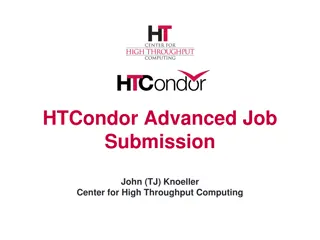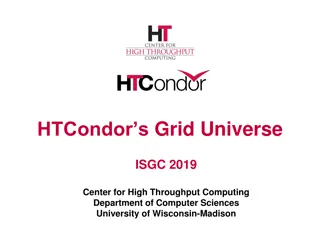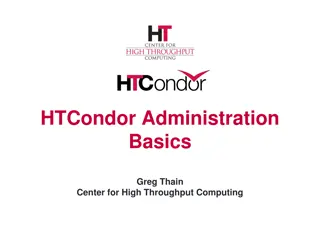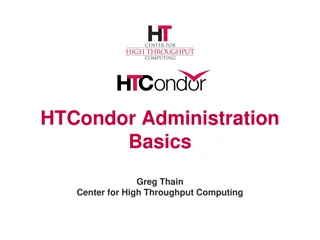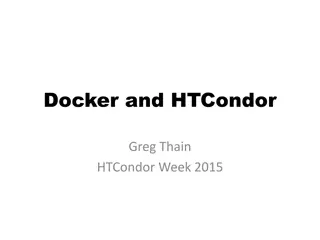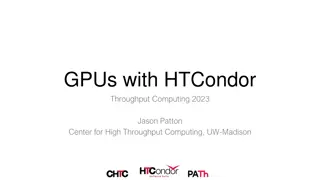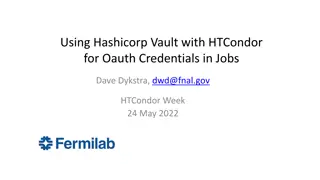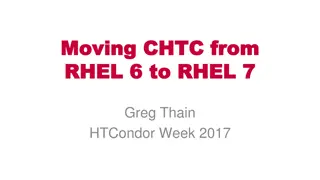Update on Computing and IAM Service Developments in WLCG/HSF Workshop
Details about the update campaign for HTCondor CEs, APEL support for tokens, and IAM service developments presented at the WLCG/HSF Workshop on May 14, 2024. Highlights include HTCondor CE upgrades, APEL support discussions, and advancements in IAM services for LHC experiments.
1 views • 12 slides
HTCondor Week 2020 Review: Bringing the Global Grid Computing Community Together
HTCondor Week 2020, hosted by Todd Tannenbaum at the University of Wisconsin-Madison, transitioned online due to exceptional circumstances. The event saw a diverse representation of over 400 participants from 25 countries. Attendees engaged with 17 contributions from 14 speakers, focusing on HTCondo
0 views • 18 slides
Efficient Anomaly Detection for Batch Systems Using Machine Learning
Explore a lightning talk session focusing on using Collectd metrics and job data in HTCondor batch systems for anomaly detection. Challenges with raw historical data are addressed through data collection, manipulation, and application of anomaly detection techniques using ML. Various algorithms such
0 views • 14 slides
Secure Access to OAuth-Based Services in HTCondor Jobs
Enhance the security of HTCondor job submissions by leveraging OAuth tokens for secure access to file storage services. Learn how the Credd and Credmon architecture facilitates the management and secure transfer of credentials, ensuring sensitive data remains protected during job execution.
0 views • 23 slides
HTCondor Submit Commands Overview
Comprehensive overview of HTCondor submit file commands, macros, and variables, emphasizing required commands, submit variables, execution point attributes, and containerization in high-throughput computing environments. Includes valuable insights and practical examples for better understanding.
0 views • 33 slides
Introduction to High Throughput Computing Notebooks with HTCondor
Explore the world of high throughput computing through Jupyter Notebooks, capable of running on laptops or remote servers. Learn to set up personal HTCondor pools, utilize Python bindings, and integrate with JupyterHub for efficient scientific computing.
0 views • 16 slides
Understanding Fermigrid: A Comprehensive Overview
Delve into the intricate workings of Fermigrid, a high-performance computing system, through detailed discussions on its components such as the batch system GPGrid, the provisioning layer Fifebatch, and the allocation of resources. Learn about Fermigrid's division between experiments, allocations vi
0 views • 12 slides
Efficient Media File Conversion Using HTCondor Advanced Job Submission Tricks
Develop an advanced submit file utilizing various techniques to efficiently convert a large set of media files to .mp4 format. Learn how to handle output filename problems and use $F() transformations for enhanced file handling in the high-throughput computing environment.
0 views • 21 slides
Understanding HTCondor Grid Universe: Job Management Capabilities and Submit File Configuration
Explore the HTCondor Grid Universe, which offers job management capabilities for high throughput computing. Learn about job delegation, fault tolerance, and different back end types supported. Understand how to configure submit files for the Grid Universe and differences from normal HTCondor jobs.
0 views • 31 slides
Understanding HTCondor Administration Basics and Architecture
Explore the basics of HTCondor administration, architecture overview, setting up personal and distributed Condor systems, key abstractions, job and machine life cycles, and interactions between submit and execute sides. Learn about the components like condor_schedd, condor_shadow, and how jobs are p
0 views • 88 slides
Understanding HTCondor Administration Basics
Explore the fundamentals of HTCondor administration, including architecture overview, job and machine lifecycle, submit and execute sides, setting up personal and distributed Condor, and interactions with schedd. Dive into the HTCondor universe, job execution abstractions, and configuration nightmar
0 views • 92 slides
Understanding Effective Use of Control Groups (cgroups) with HTCondor
Control Groups (cgroups) in HTCondor provide fault tolerance by managing access to resources like CPU, memory, devices, and network. They improve resource utilization measurements, ensuring job stability and performance. Learn how cgroups work hierarchically, manage memory usage, and how to enable t
0 views • 15 slides
Introduction to Docker and HTCondor in High-Performance Computing
Explore the evolution from HTCondor's use of chroot for job isolation to the adoption of Docker containers for managing Linux containers in high-performance computing environments. Understand the benefits and challenges of utilizing Docker with HTCondor, highlighting the shift towards more efficient
0 views • 49 slides
Maximizing GPU Throughput with HTCondor in 2023
Explore the integration of GPUs with HTCondor for efficient throughput computing in 2023. Learn how to enable GPUs on execution platforms, request GPUs for jobs, and configure job environments. Discover key considerations for jobs with specific GPU requirements and how to allocate GPUs effectively.
0 views • 22 slides
Integrating Hashicorp Vault with HTCondor for Secure Oauth Credential Management
Exploring the use of token-based authentication over X.509 certificates for improved security in HTCondor workflows. The transition to tokens offers enhanced control and flexibility, with a focus on utilizing JWTs and Scitokens. Leveraging Hashicorp Vault alongside HTCondor streamlines the managemen
0 views • 18 slides
Overview of KBase and HTCondor Integration for Systems Biology Predictions
KBase is an open software platform for systems biology, offering predictive and design capabilities for biological functions. It integrates data and analytical tools for genomics research of microbes, plants, and their communities. HTCondor is chosen for fair queueing and resource limit settings due
0 views • 12 slides
CHTC System Migration Strategies Revealed at HTCondor Week 2017
In these detailed presentations, Greg Thain discusses the process of transitioning the CHTC system from RHEL 6 to RHEL 7, highlighting the importance of migration without complications, the necessity of ecryptfs for an encrypted sandbox on CentOS, and the shifting OS preferences of CHTC users toward
0 views • 32 slides
